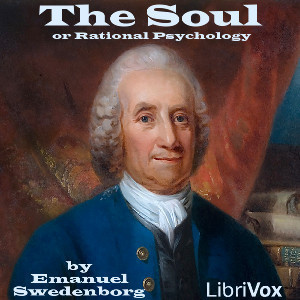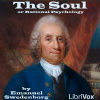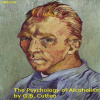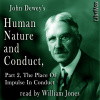Emanuel Swedenborg - Soul or Rational Psychology
Emanuel Swedenborg
100%
Speed
Readers
Length
15 hours 16 minutes
Year
1887
Summary
Swedenborg, Emanuel, 1688-1772, was born in Stockholm, Sweden and died in London, England. He was a voluminous writer of scientific treatises as well as prophetic works such as Archana Caelestia and The Divine Providence. He said he had encountered supranational agencies and communicated with angels. This is a recording of the 1849 translation of his 1743 book The Soul or Rational Psychology (Regnum Animale, Pars Septima De Anima) Latin. He took his cue from Aristotle's De Anima.A few quotes
It has been shown above that the harmonies themselves are innate with us, or that we perceive them without a teacher; as the sweetnesses of taste and smell, the symmetries of sound, the excellencies and beauties of nature; in a word, the very order of things or the harmony of modes, forces, substances, and forms. Thence also we may perceive the very truths of things, for these correspond to the order itself in nature; and this is the reason why order is called «the transcendental truth.»
In order that the human intellect may exist, it is necessary that the truths themselves be variegated and as it were modified by things mendacious, or true things with false, good with evil.
There are as many worlds as there are terrestrial societies, and there are as many heavens as there are celestial societies. The love of society is both natural and acquired, for to live alone or to live without society is not to live, for whatever is one's own is not known as one's own except from others, or relatively.
When we strive for and desire what we love, and yet impossibilities interfere with our attaining our end, we call this state of desire hope, and it seems to be in the will viewed as an endeavour which these obstacles are preventing from coming forth into act and motion. Thus hope is not an affection of the mind, but of its will. For the will always endeavours to act, but so long as it is resisted does not act. Meanwhile it is affected by a certain hope, so that it remains balanced between action and inaction. Despair exists when we cut off hope; then also when, in the end itself, love and ambition, that is, the life and ardour of the mind, collapse and are as it were extinguished.
There is a liberty of thinking and a liberty of acting; and in the middle between these two there is as it were the liberty of choosing , in which properly free will consists; and that our mind is not capable of ruling whether the objects of the senses and their exciting influences, both from the body and the world, shall flow in or not, but it is capable of choosing whether these sensations and excitements shall flow out and be determined into act."
This third edition of the 1849 translation was published in 1914. Johann Friedrich Immanuel Tafel, 1796-1863 devoted himself to translating Swedenborg into German, and Frank Sewall, 1837-1915 into English. Sewall included a long introduction and three appendixes to Swedenborg's work. The introduction is included in this reading but the appendixes have been omitted.
Authorization
By logging in, you agree to the terms and conditions.












No comments